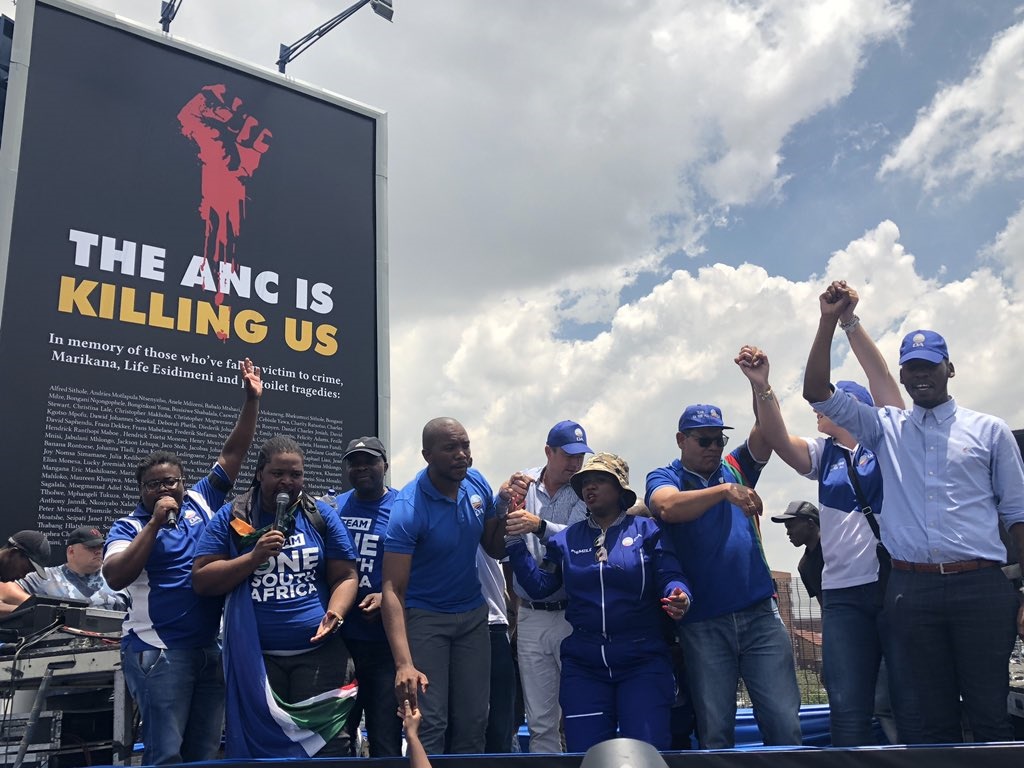News24.com | DA to be third wheel in upcoming elections
DA to be third wheel in upcoming elections
2019-02-19 06:00

The two dominant political parties that have been under public pressure regarding their position on corruption stand to do well in the forthcoming elections, while the DA will have to hang on for dear life, writes Ralph Mathekga.
The 2019 general elections are poised to be a battle between the ANC and the EFF; the proverbial David and Goliath.
A shocking point of the forthcoming elections is the poor showing by South Africa's most experienced opposition party, the Democratic Alliance (DA) in the build-up.
The elections will be about how much stronger the Ramaphosa-led ANC will perform and how much reward the EFF will attain for all the noise they have been making since the 2014 elections. Unfortunately for the DA, the party will need to aim only for maintenance of its current electoral hold. Indeed, electoral growth is becoming increasingly elusive for the DA as the elections approach.
There are strange things about the 2019 elections. The two dominant political parties that have been under public pressure regarding their position on corruption stand to do well in the forthcoming elections. The ANC is battling mounting allegations of corruption as revealed in various inquiries that are underway. Despite all this, it recently polled above 60% which means that the party will maintain its electoral hold.
It also means that everything that has happened in the country in the last nine years will not matter, despite Ramaphosa's "nine wasted years" outburst.
The EFF has faced its own problems regarding allegations of corruption relating to the VBS bank. The party has denied allegations that its senior members benefitted unduly from the VBS looting. Its leaders are often in the spotlight due to allegations that they court controversial characters in society – alleged tobacco smugglers and so forth.
Despite criticisms that it is not genuine about anti-corruption, the leadership of the party has held together in what they consider a hostile media environment. As the elections come closer, the EFF leaders seem to focus much on how to discredit Ramaphosa's agenda of clean government.
Having become accustomed to mediocre opposition politics that flourished during Jacob Zuma's presidency, the EFF had to quickly right-size Ramaphosa and find a way to discredit him. They went for the easiest spot: Ramaphosa's relationship with the private sector.
I won't be surprised if the EFF files a class action suit against Lonmin's directors, just to drag Ramaphosa back into Marikana. Marikana is a tragedy that exposed a toxic relationship between political elites and the business community. With this in hand – the suspicion that Ramaphosa is there for the benefit of his business allies – the EFF will be back to a single-issue opposition path.
But the EFF has managed to renew itself quickly since Zuma left office.
On the other side of the opposition is the DA, a party that has not been able to find itself since Zuma left office back in February 2018. The DA has been preoccupied with internal squabbles; things that could have been processed way better than has been the case. For example, a regional matter relating to the removal of Patricia de Lille as the mayor of Cape Town became a national matter begging questions about the party's appreciation of non-white members.
The DA went to their 2018 elective conference a divided party on matters related to race as a factor in determining economic opportunities. It is also finding it difficult to explain their strategic interest in governing some metros through coalitions with the EFF, a party that often offends DA constituents.
If one compares the moral challenges confronted by the ANC and the EFF respectively, the issues that the DA have been struggling with look very minor. There is no doubt that the DA must address the question regarding how to craft its identity as a party that can be trusted to govern at national level, beyond governing municipalities and one province.
If the DA were to find itself in power next week, my guess is that the party would not know what to do. The DA would enthusiastically implement ANC policies while figuring out what it stands for.
Despite all of this and in comparison, the DA should not be punished for those mistakes in the sense that those are relatively lesser transgressions compared to allegations against the ANC and the EFF, respectively.
Failure of the DA to grow in the May 8th elections will also signal that the party would most likely lose its legitimacy as an opposition. Its opposition style would have been disapproved.
In the likely event of the EFF attaining more than 10% electoral support, it will have serious implications for the DA's standing as the official leader of the opposition. Poor performance of the party in the forthcoming elections will redraw the boundaries regarding what type of opposition politics is wanted by the electorates.
With the decline of the DA, the EFF will become more influential in defining opposition politics in South Africa. That will change South Africa's politics tremendously.
- Ralph Mathekga is a senior researcher at UWC's Centre for Humanities Research, and author of When Zuma Goes and Ramaphosa's Turn.
Disclaimer: News24 encourages freedom of speech and the expression of diverse views. The views of columnists published on News24 are therefore their own and do not necessarily represent the views of News24.

